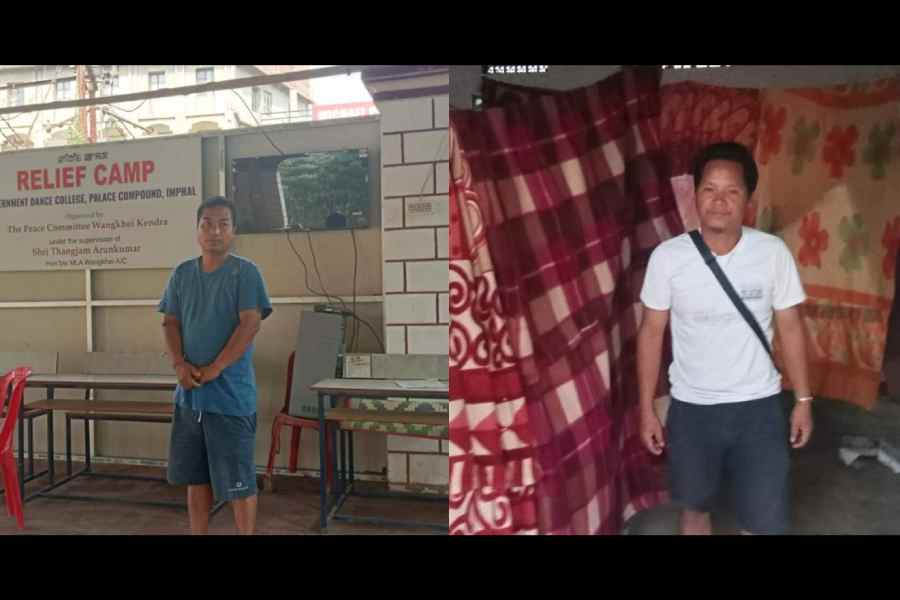Govind Koijam, 37, used to be a school headmaster in Moreh town of Manipur, leading a life of contentment with his family.
Thangchung Haokip, a year younger than Koijam, lived in Lonplkhonou Sugnu village of Chandel district and taught at a higher secondary school.
Their earlier lives, shattered by the conflict between Meiteis and Kuki-Zos that erupted on May 3 last year, feel like a dream to them today. Both are now homeless and jobless.
Koijam’s house was among the hundreds torched by a Kuki-Zo mob in Moreh, Tengnoupal district. He is now staying in a relief camp in Imphal, about 110km from Moreh. Koijam, a Meitei, sells vegetables at a market near the camp.
A Meitei mob set fire to Haokip’s home, forcing him to take refuge in a relief camp in Churachandpur, about 27km from his village. Haokip, a Kuki, is making use of his time acquiring new skills in computers and electrical wiring.
Koijam and Haokip, victims of the continuing conflict that has scarred lives and
destroyed livelihoods, wonder why the violence couldn’t be contained right at the
initial stages.
They also want to know what has prevented Prime Minister Narendra Modi from visiting Manipur even once, and what led him to claim a “marked improvement” in the situation.
For the duo, living in relief centres 63km apart, their right to vote is the last thing on their minds.
A Kuki MLA from the BJP, the state’s ruling party, summed up the general mood: “In the context of Manipur, this parliamentary election seems different from previous ones, with the people in the valley and the hills disillusioned and poised to voice their disillusionment.”
While Meiteis are the majority in the Imphal valley, Manipur’s hills are dominated by tribal populations, who include the Kuki-Zo.
It’s against this backdrop that Manipur’s two Lok Sabha seats, Inner Manipur (valley) and Outer Manipur (hills), go to the polls: Inner Manipur on April 19 and Outer Manipur on April 19 and 26.
While the BJP now holds Inner Manipur, its ally NPF holds Outer Manipur.
If campaigning in Imphal has been low-key, there’s no sign of an impending election in Churachandpur: in the Kuki-Zo-majority hill districts, discussions have been held only on whether to vote or not.
Haokip says he is uninterested in politics but wants the next government at the Centre to find an amicable solution for Manipur’s Kuki-Zo people who face social inequality and an uncertain future.
“Restoration of peace should be the priority of the new government,” Haokip said at the relief camp that has been his home since June 6.
Koijam echoed Haokip. Restoration of peace will mean he would be able to return to Moreh. He wants the MPs who get elected from the state to flag the issues and concerns of Manipur.
Haokip said the Prime Minister’s failure to visit Manipur and his comment about a “marked improvement” went to show that “Modi does not care about the suffering Manipur is going through”.
“He is a father figure as Prime Minister but he did not ensure peace when his children (Meiteis and the Kuki-Zo) were fighting. He could come to neighbouring Assam twice but not to Manipur,” he said.
Koijam said Modi should have visited the state, reassured the people, and exerted pressure on both sides to resolve their differences through talks.
“If the Delhi riots of 2020 could be contained in two to three days, why is the Manipur conflict continuing for 11 months?” Koijam asked.
It’s a question echoing in many minds, but without a ready answer.











